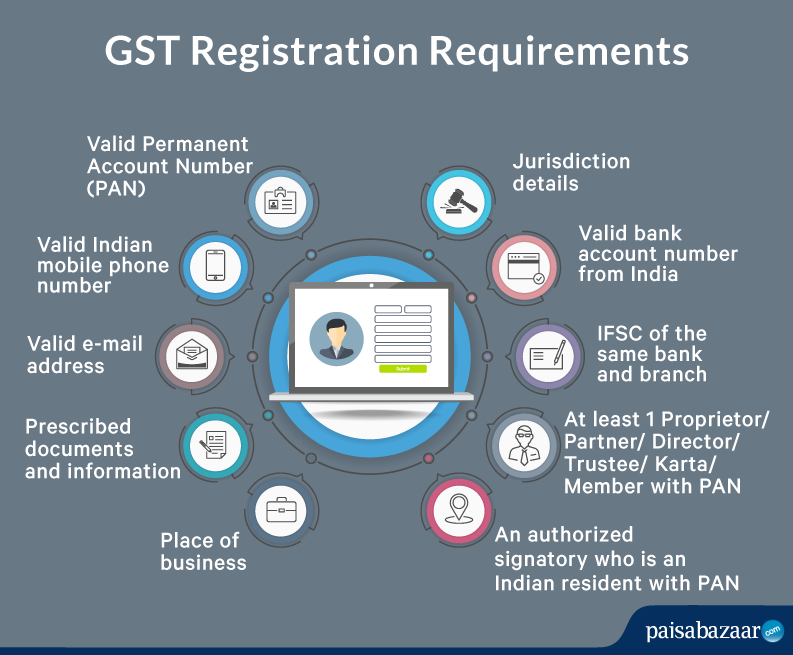Total Guide to Get Your GST Registration Done Today in Singapore
Total Guide to Get Your GST Registration Done Today in Singapore
Blog Article
Step-by-Step Overview to GST Registration: Every Little Thing You Need to Learn About the Application Refine

Qualification Standards for GST Enrollment
Satisfying the eligibility criteria for GST enrollment is a fundamental need for services running in India. Based on the Goods and Provider Tax Obligation (GST) legislation, entities involved in the supply of services or goods have to register for GST if their annual turn over surpasses the recommended threshold. For regular companies, this threshold is evaluated 40 lakhs for products distributors and 20 lakhs for provider. Additionally, specific unique category states have a reduced threshold of 10 lakhs. Businesses involved in inter-state supply, laid-back taxable persons, non-resident taxable persons, and those needed to pay tax under the reverse fee system should additionally register for GST, regardless of their turn over.
In addition, specific companies such as ecommerce operators, representatives of a supplier, input solution suppliers, and individuals providing by means of e-commerce platforms are also required to sign up for GST, despite their turn over. Comprehending and meeting these qualification standards are crucial steps for organizations aiming to conform with the GST laws in India.
Required Files for Application
When obtaining GST registration, services require to offer certain files to complete the application procedure efficiently and properly. The required files vary depending on the sort of company entity looking for enrollment. For a single proprietorship, the papers typically include the proprietor's PAN card, Aadhaar card, address proof of the workplace, checking account declarations, and photos. Collaboration firms need to submit collaboration action, PAN cards of companions, Aadhaar cards, address evidence of the primary business, bank account statements, and photos. Business must supply their Certification of Unification, Memorandum of Association, Articles of Organization, PAN cards of directors, Aadhaar cards, address evidence of the licensed workplace, bank statements, and photos. Furthermore, all entities must submit evidence of the business, like rental agreement or electrical energy expense, and authorization types. Making certain that all necessary papers remain in order and sent correctly is essential for a smooth GST registration process.
Step-by-Step Application Process
To effectively complete the GST registration process, companies need to follow an organized detailed application procedure. Next off, provide the required information such as the legal name of the business, PAN, email address, mobile number, and state in which the service is situated.

Comprehending GST Enrollment Costs
Recognizing the fees related to GST enrollment is browse around here crucial for companies seeking conformity with tax obligation guidelines. The GST enrollment charges vary relying on the sort of service entity making an application for registration. For routine taxpayers, the cost is 1000, divided equally between the Central and State Federal Governments. However, for organizations running in multiple states, the cost is 5000, likewise separated between the Central and State Governments. When it comes to non-resident taxpayers or casual taxpayers, the enrollment fee is 5000. Additionally, particular entities are excluded from paying the registration cost, such as input service distributors, UN bodies, embassies, and so on. It's critical for companies to element in these registration costs when intending their compliance budget. Failing to pay the requisite charges can lead to hold-ups in the enrollment procedure and non-compliance with GST regulations, resulting in penalties and lawful consequences. For that reason, understanding and budgeting for these charges are integral parts of the GST enrollment process.
Avoiding Usual Application Errors
In browsing the GST registration procedure, avoiding common application mistakes is vital for companies aiming to enhance conformity treatments and avoid prospective troubles. One prevalent mistake businesses make is offering inaccurate details, such as going into incorrect PAN information or business names. Verifying all information before entry is essential to prevent delays in the application procedure. Another typical error is falling short to provide the necessary supporting documents, leading to being rejected or extended processing times. Making certain all needed documents are submitted properly and are up to day can significantly speed up the enrollment process. Additionally, services often neglect the relevance of selecting the right company structure during registration. Choosing the incorrect kind, such as signing up as a regular taxpayer rather than a make-up supplier, can cause issues down the line. By meticulously reviewing and confirming all information offered throughout the GST registration application, organizations can minimize these usual errors and promote a smoother enrollment procedure.
Conclusion
To conclude, recognizing the eligibility requirements, needed documents, application procedure, charges, and common mistakes Find Out More to prevent are crucial advice actions in successfully registering for GST. By following the step-by-step overview given, services can make sure a reliable and smooth application process. It is essential to adhere to the standards established forth by the authorities to avoid any delays or problems in the registration procedure.

The GST enrollment costs differ depending on the kind of organization entity applying for registration. In addition, companies typically ignore the significance of selecting the proper business framework throughout registration - Get your GST registration done today in Singapore. By very carefully examining and double-checking all details given throughout the GST registration application, organizations can minimize these common mistakes and facilitate a smoother registration procedure
Report this page